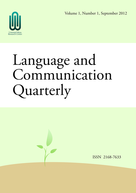


Volume 13 Issues 1-2 (2024-06-30)
Volume 10 Issues 1-4 (2021-12-31)
Volume 9 Issues 1-4 (2020-12-31)
Volume 8 Issues 1&2 (2019-06-30)
Volume 7 Issues 3&4 (2018-12-31)
Volume 7 Issues 1&2 (2018-06-30)
Volume 6 Issues 3&4 (2017-12-31)
Volume 6 Issues 1&2 (2017-06-30)
Volume 5 Issues 3&4 (2016-12-31)
Volume 5 Issues 1&2 (2016-06-30)
Volume 4 Issues 3&4 (2015-12-31)
Using a questionnaire, this study examined 66 English faculty members’ perceptions of assessing Chinese college students’ English pragmatic competence and its impact on learning and teaching. Results show that, to some extent, these faculty members realize the importance of pragmatic competence in assessing Chinese college students’ English proficiency and have become aware of the challenges in assessing their students’ English pragmatic competence. These challenges include insufficient pragmatic teaching in the classroom, lack of exposure to English language use and English culture, focusing on assessing students’ linguistic rather than pragmatic competence in the classroom, and lack of knowledge of what aspects of pragmatic competence and how these aspects should be assessed. Important implications are discussed.
Fear occupies an undeniable portion of our lives and in most cases represents an incentive and driving force underlying our acts. The paper examines discursive practices of generating fear through direct intimidation and by overemphasizing and/or fabricating versatile widecoverage taints (reader’s/listener’s imperfections and flaws) deployed for the purpose of inducing feelings of guilt and insufficiency. It also tackles the issue of semantic polarity (juxtaposing two stylistically more or less identical but semantically opposing blocks of text) discussing its impact on the message recipient and the concepts it endeavors to establish in them in order to influence their future choices and conduct. Attention is also paid to semantic association, which proves to be another intimidating technique frequently utilized in religious discourse to supercharge selected lexical items with the meanings the writer/speaker purposefully attaches to these, thereby exploiting excessive signification (in the Saussurean sense) to achieve their intended persuasive effect. The paper, which is based on the author’s research and analysis of a corpus of religious texts, illustrates the individual phenomena by presenting examples selected from sources used by several denominations and religious movements (Christians, Latter-Day Saints, Jehova’s Witnesses, Satanists, Scientologists, etc.). Besides, it statistically maps the distribution of direct intimidation and versatile wide-coverage taints segments across these sources and points out the recent trends in persuasive mechanisms deployed to induce a change of individual’s opinion and/or behavior.
This study explored the transitory experience of college students with self-identified learning disabilities and their first year of school. Six students volunteered to participate in semi-structured interviews. The interviews took place during the spring semester of the students’ firstyear experience, and each student offered their unique perspective of being a college student with a learning disability. Participants represented a variety of learning disabilities which included: ADD, ADHD, short-term memory loss, and reading comprehension and handwriting difficulties. In relation to the transitory experience, three themes emerged from the interviews: communication, independence, and time. In terms of their learning disabilities and the accommodation process, the participants indicated their first year of college was a much different experience than prior school years.
This paper explores early linguistic expressions of answer-seeking behaviors by toddlers in the kindergarten classroom. This field has seen very little scholarly interest within Greek culture. The dialogues of toddlers with their teachers are divided into thematic sub-categories and analyzed through the lens of critical discourse analysis. This study concludes that young children are able to judge, often quite rigorously, the meaning of words and performances used by kindergarten teachers, particularly when the educator provides a democratic classroom. Consequently, educators need to recognize these behaviors and engage these creative opportunities for developing linguistic skills in order to jumpstart vocabulary development.
UI JOURNALS
With the goal of advancing research in the social sciences, Untested Ideas (UI)
Research Center provides the researchers and scholars worldwide with resources,
grants, and academic exchange platforms and channels through research interest
groups, memberships, funded research projects, annual conferences, training
workshops, and publications. The mission of UI Research Center is to serve the social
sciences researchers and scholars in the world and aim to promote advanced and
cutting-edge research methodology, publish investigations on new and untested ideas,
and disseminate research findings that make original and significant contributions to
the social sciences.